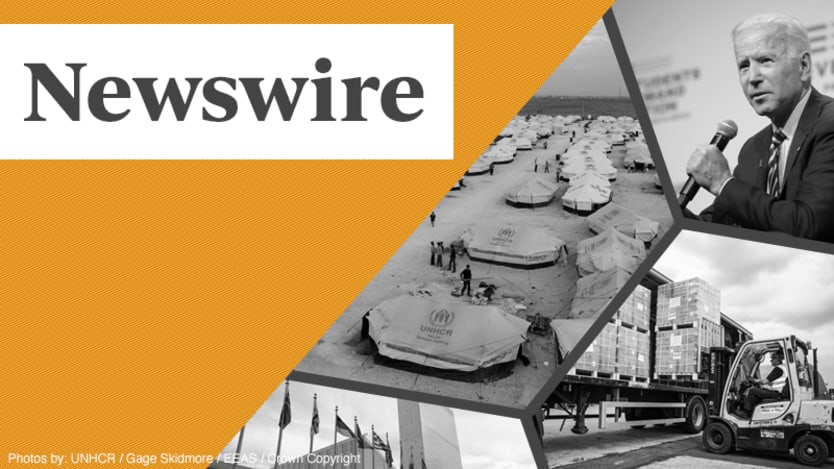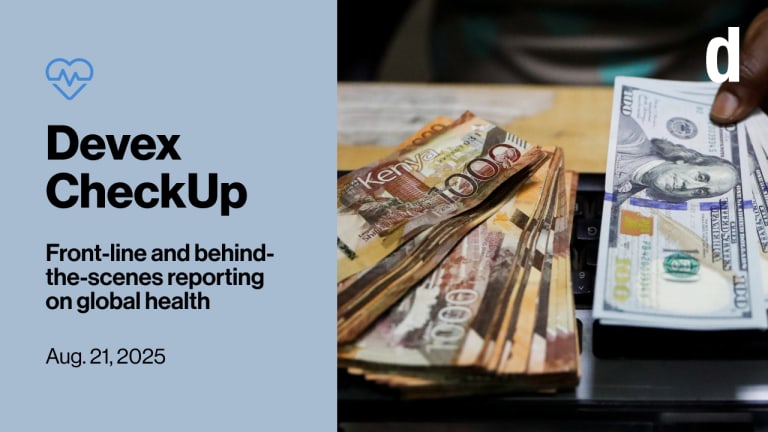
This is a preview of Newswire
Sign up to this newsletter for an inside look at the biggest stories in global development, in your inbox daily.
Kenya instituted a cash transfer program to help its most vulnerable citizens cope with the pandemic. Now civil society groups want to know where the money went.
+ A career in global health. Today at 1 p.m. ET (7 p.m. CET), a senior recruiter with PATH will discuss the organization’s current hiring priorities and share advice for professionals interested in a global health career. There’s still time to register.
COVID-19 has been a boon for cash transfer programs and other social protection schemes. With businesses shuttered, people out of work, and in-person service delivery often impossible, the ability to send payments directly to people via mobile phones has offered a powerful lifeline. Some even wondered if global development might be heading towards a “new equilibrium” with cash transfers and social protection at its center.
Easier said than done.
Early in the pandemic, Kenyan President Uhuru Kenyatta announced a national cash transfer program initially aimed at reaching 669,000 households — though it ultimately reached half that number, the government says. Apart from the limited scope, Human Rights Watch is now pointing to flaws in the rollout of the program, Sara Jerving reports.
“While those enrolled last year were supposed to receive 35 weekly transfers at 1,000 shillings [$9] apiece, HRW found that most received far fewer, such as only two or four payments in total,” Sara writes.
The report also found major transparency gaps in the criteria for selecting people to receive the transfers. A community mobilizer who went door to door in the informal settlement of Mathare to identify particular vulnerable people as potential recipients, says that very few of them ever received any money.
Family, friends, and supporters of government officials, on the other hand, reportedly found it easier to enroll.
Read: 'Who received that money?' Report probes Kenya's COVID-19 cash program
On the agenda
“Global health security” is having a moment. But the phrase means different things to different donors, Lisa Cornish reports. How does the U.S. define health security in its global work, and where are these billions going? A deep dive into data provided through the foreign aid explorer sheds some light.
Devex Pro: How the US spends on global health security
Conflict management
The relationship between the U.K. government and the country’s development community was tense even before last week’s vote in parliament that left the fate of Britain’s foreign aid funding commitment in doubt.
Despite that setback, one of the Conservative MPs who spearheaded efforts against the government’s proposal is part of a new coalition that hopes to bring the insights and experiences of aid groups working in conflict areas into government policy discussions.
“I think we will have a good opportunity to bring ministers in front of us and have frank and honest conversations, and ensure they are hearing first hand from the experts and from those who are on the ground,” says Anthony Mangnall, who will co-chair the political arm of a new grouping of 11 NGOs calling themselves the Action On Conflict Alliance.
Read: Aid rebel MP Anthony Mangnall still hopes to influence FCDO
New world order
Recent analysis has shown that China’s shares of U.N. budgets will match those of the U.S. in six to eight years, which will further alter the underlying dynamics behind contributions and influence.
— Peter Yeo, president, Better World CampaignOpinion: How should the US respond to China at the UN?
Too soon
The World Bank is aiming to get 50% of its Washington-based staff back to work in the institution’s headquarters by September, Shabtai Gold reported last month. But, the COVID-19 outlook has not improved enough to allow the annual meetings frenzy to resume just yet.
The International Monetary Fund announced Tuesday that October’s gathering will follow a hybrid model once again — with members of the institutions’ governing committees meeting in person, while other public, press, and invite-only sessions stay online.
In other news
U.S. climate envoy John Kerry on Tuesday marked the start of the 100-day countdown to COP 26 with a call to China to do more to curb its carbon emissions. [The Guardian]
Myanmar's military junta once again seeks to install a new country ambassador to the U.N. to replace Kyaw Moe Tun, the currently recognized representative at the global body. [Washington Post]
The death toll from COVID-19 in India could be 10 times higher than the official count, with excess deaths estimated to be between 3.4 million and 4.9 million, according to the Center for Global Development. [The Telegraph]
Sign up to Newswire for an inside look at the biggest stories in global development.








